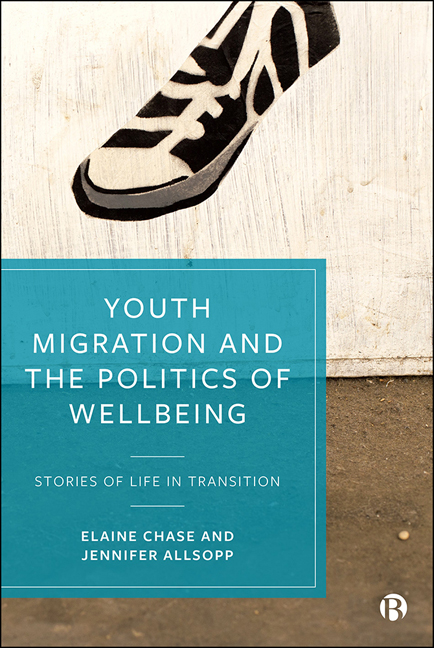Book contents
- Frontmatter
- Contents
- List of Figures
- Acknowledgements
- Foreword
- ‘Future’
- 1 Introduction
- 2 Conceptualizing Wellbeing in the Context of Migration and Youth Transitions
- 3 Capturing Wellbeing in Transition: An Alternative Approach
- 4 ‘Iron Rod’ or ‘Colander’? Welfare Regimes in England and Italy
- 5 The Pursuit of Safety and Freedom
- 6 Legal Integrity and Recognition
- 7 Identity and Belonging
- 8 Constructing Viable Futures as ‘Adults’
- 9 Emotional and Mental Wellbeing
- 10 Friendships, Connections and Relationships
- 11 Transnational Family and Connections
- 12 Conclusion
- Endnotes
- References
- Index
6 - Legal Integrity and Recognition
Published online by Cambridge University Press: 21 April 2021
- Frontmatter
- Contents
- List of Figures
- Acknowledgements
- Foreword
- ‘Future’
- 1 Introduction
- 2 Conceptualizing Wellbeing in the Context of Migration and Youth Transitions
- 3 Capturing Wellbeing in Transition: An Alternative Approach
- 4 ‘Iron Rod’ or ‘Colander’? Welfare Regimes in England and Italy
- 5 The Pursuit of Safety and Freedom
- 6 Legal Integrity and Recognition
- 7 Identity and Belonging
- 8 Constructing Viable Futures as ‘Adults’
- 9 Emotional and Mental Wellbeing
- 10 Friendships, Connections and Relationships
- 11 Transnational Family and Connections
- 12 Conclusion
- Endnotes
- References
- Index
Summary
‘That's why I say the papers are very important for everything. Because they will change your life, you know? Your brain, everything is gonna be replaced. My brain is not relaxed to be honest. Everything is completely changed if you got a right to stay, everything. The people right here they have a right, I can't do nothing. But hopefully everybody have it, hopefully one day I gonna have it.’ (Aslan, Afghanistan)
Aslan came to the United Kingdom (UK) when he was 16, and for the first 18 months or so he was supported by social services, provided with accommodation and able to attend college. Everything changed when an age assessment determined that he was over 18 and shortly afterwards he was refused asylum. No longer eligible for publicly funded support and scared of being deported, Aslan continued living in the UK without papers for a couple of years before he was arrested, detained for five months in three different detention centres and then forcibly removed back to Afghanistan. Finding life in Afghanistan intolerable, within a couple of months he had migrated again. This time he ended up in Italy, where he was given a temporary visa that could be extended contingent on finding work. Despite his best efforts, Aslan was unable to find work in Italy. He had no ties or connections there and could not speak Italian. After more than 15 attempts to get to the UK via France, he finally arrived hidden in the back of a lorry, made his way back to the city he considered ‘home’ and where, at the time of the research, he continued to live precariously through the support of friends and networks and picking up piecemeal, low paid work in car washes, building sites or restaurants. Almost ten years since he had first arrived in the UK, Aslan was still hopeful that one day he would gain the illusive ‘papers’ he needed to build his future.
This chapter engages with the realities of living with or without legal recognition in England and Italy and the impact this has on young people such as Aslan. It considers these experiences within international and national frameworks of young people's rights and ‘best interests’, alongside the serendipitous ways in which access to such rights are in fact socially constructed.
- Type
- Chapter
- Information
- Youth Migration and the Politics of WellbeingStories of Life in Transition, pp. 93 - 112Publisher: Bristol University PressPrint publication year: 2020

